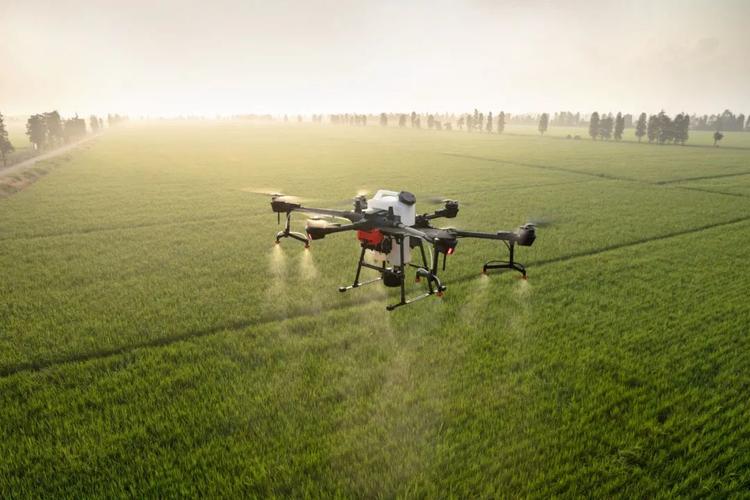This summer, Meng Bowen, a 2021 modern agricultural technology post-00s student at Wuhu Vocational and Technical College, experienced the taste of “facing the loess and facing the sky”. He took his “partner” – plant protection drone to Sanyuan Village, Wanzhi District, Wuhu City to help villagers spray rice potion.
In mid to late June, the local temperature exceeded 36 degrees Celsius, and warm air rushed in. Despite sweating profusely, Meng Bowen, standing by the edge of the rice field, kept an eye on the drone’s flight and could not relax for a moment. When the drone ran out of medication, he changed it in a timely manner and dared not delay the progress at all. Each operation lasts about two hours and can cover nearly 200 acres of rice fields with spray.
For a period of time, like Meng Bowen, more than 20 teachers and students from the Forestry and Garden Art College on this campus have walked into the fields, actively learning and utilizing classroom knowledge, providing technical services such as prevention and control technology, crop disease diagnosis, drone spraying, etc., helping farmers, large households, and cooperatives solve practical problems, and opening a classroom for the integration of science and education, industry and education, in the rural frontline.
In recent years, Wuhu Vocational and Technical College has organized young teachers and students to go to the front line to support agriculture. In the busy farming season, the increasing workload, lack of skills, and shortage of manpower are causing pain points that plague grassroots cooperatives and farmers. To this end, the school organized relevant functional departments and secondary colleges to jointly develop a solution, and decided to have backbone teachers lead the team to carry out “one-on-one” services with the cooperative.
The drone plant protection service provided by the Forest Garden Art College on this campus is one of the solutions. As early as July 2022, the college established a drone training room and conducted drone related teacher training. In April this year, the college and the school enterprise cooperation unit Wende Agricultural cooperative in Liulang Town, Wanzhi District jointly established the “Rural Revitalization Technical Service Team” to create an agricultural development community: the school team is responsible for technical services, and the cooperative is responsible for technology promotion. Both sides plan to carry out UAV plant protection services for 1 county and 5 districts in Wuhu, with a total of about 15000 mu of farmland.
”That afternoon, he organized class students to conduct on-site investigations and research. In the past, farmers used small electric spray or four wheel machines to spray pesticides, which was time-consuming and inefficient. Some farmers carry small electric spray in the fields and carelessly leave pesticide residues on their bodies, which can also cause slight poisoning.
After listening to the demands and doubts of cooperatives and farmers, Pu Qiangsong realized that agricultural plant protection drones with small size, simple operation, and low cost could be used for operations. Farmers happen to have Electric trike, which is convenient for loading and transporting liquid medicine and UAV back and forth.
So, he convened a meeting with more than 20 students majoring in modern agricultural and horticultural technology to discuss the key points of the assignment: the plant protection drone should be kept at a height of about two meters from the crops throughout the entire process, so as not to damage the crops or the soil in the field; Equipped with the latest centrifugal nozzle, the atomization effect is good, the working area is wide, and it saves water and medicine; Combined with the downward pressure of the propeller wind, the crop leaves roll up, down, left, and right, and the medicine can be evenly sprayed on the upper and lower roots of the leaves
Zhu Zhiguo believes that in order to run agricultural vocational education well, students and teachers cannot just “farm” on the blackboard. To improve their true skills, they must go deep into the frontline. Students enhance their willingness to “learn from agriculture” and enhance their professional skills through winter and summer practice, enterprise internship, and grassroots service. Teachers can also truly write scientific research achievements in rice paddies.







Please sign in to comment
register